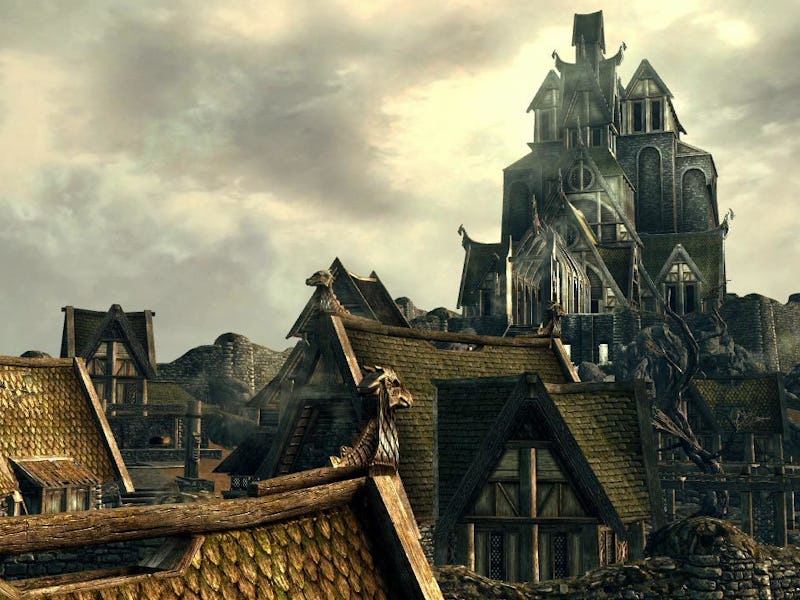4 Lessons In Personal Finance From 'Skyrim'
It's not all vampire-slaying and shouting at dragons.

Skyrim is a big game with a lot going on. The world of the game is huge, its items and quests are abundant, and its lessons are plentiful. Sure, Skyrim is pretty removed from everyday life, but that doesn’t mean it doesn’t have a thing or two to teach us.
As it turns out, Skyrim can be particularly educational when it comes to personal finance. Managing money, inventory, and assets can be a tricky business. But there are a few lessons from Skyrim’s complex inventory and commerce systems that might help you take your personal wealth game to the next level.
1. Diversification
Before you buy a house in Skyrim, you’re options for stashing goods that are too heavy for your amateur war machine body to carry are limited to chests in public locations. As such, your shit is not very safe. Until you invest in some property in charming Whiterun or ritzy Solitude, you risk having your stuff stolen while you’re off on quests. So how do you protect the precious goods you’ve purchased, picked and pilfered?
Diversify, of course. There are a lot of chests out there, and there aren’t enough thieves to steal all your stuff while you’re infiltrating the Dark Brotherhood. Even if you do purchase a house, it’s not a bad idea to spread your inventory around, just in case you find your home outside of Morthal suddenly overrun by bunch of giants. Spread the wealth and you’re a less likely to lose everything if anything goes south.
2. Your Shit Is Never Worth As Much As You Think It Is
Sure, your inventory says that the Dwarven Battleaxe of Animus is worth 740 gold, but there’s no way on the gods’ green Tamriel that you’ll get that when you try to offload it. The value’s a nice pipe dream, but it’s important to be realistic — the shopkeepers aren’t about to pay retail for the crap you’ve been lugging from Dawnstar to Windhelm, and they don’t care that you’re saving up for the McMansion in Solitude because your neighbors in Markarth are jerks.
Markarth is full of jerks.
Approach your transactions with healthy pessimism and accept that you’re just a cog in the grand economic machine and you’ll be better able to gauge your wealth and cash-flow situations.
And while we’re on the subject, be sure you don’t accidentally sell something you meant to hold onto because when buy it back, the price will definitely going to go up.
3. Keep A Cushion
There’s a bunch of cool stuff to buy in Skyrim and all of it looks particularly opulent and drool-worthy when you’re a level 3 with several hundred gold to your name. Even so, you need a cushion, lest you venture headlong into a tussle with a Frost Troll and you’re without enough Healing Potion to survive and no money to replenish your supply. You’ll be stuck killing bandits for gold or picking Deathbells until you can amass the small fortune it takes to build a respectable first aid kit.
You’re better off saving your gold and getting by with the minimum, keeping a little money aside as a cushion, should you need to make an important purchase immediately. It’s really easy to turn money into more money, but pretty difficult to take over Tamriel when you keep emptying your pockets for the latest and greatest battleaxes. So leave some cash in your account for the last-minute essentials and emergency items.
4. Track Your Inventory And Assets
The more you play, the more shit you inevitably accumulate; and the more shit you have, the harder it is to keep track of. If you just toss swords and potions and amulets into any random chest with abandon, you’re going to have a hard time finding the enchanted bear helmet you crafted when you need it. Moreover, you’re going to end up buying a bunch of stuff you don’t need because you don’t have a good grasp on where you put your stuff. Don’t go mixing up your weapons chest with the drawer where you keep gifts for your wife and kids, and devise a system to keep track of your potions and ingredients so you don’t end up buying 10 Healing Potions only to find that you’d already had 30 stashed at home.
There are all kinds of places to store things, so keep them separate. Before you embark on a big quest, check your war chests, gear up, and sell what you don’t need. Keep your inventory wide but lean, meaning that there’s no reason to have six different kinds of armor when you’re only going to wear the best of the best. Liquidate what you don’t use and build up that cushion. That said, you should probably hold onto all of those soul gems. Just in case.